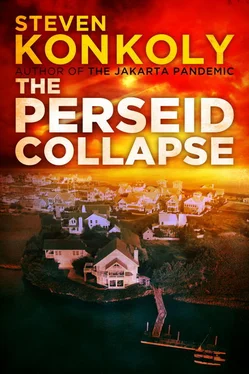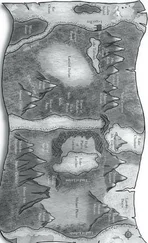“This is unreal,” he said, plucking their wooden napkin holder out of the water.
“Careful, Danny,” cautioned Ed.
The water’s retreat was barely noticeable, but Charlie was right. The water sat an inch below the ceiling line and appeared to lower another inch while they watched.
“Samantha?” Charlie called.
They all looked back at their red-faced, crew-cut neighbor.
“You don’t worry one bit about Chloe. I’ll help you get her back safe. You can count on me for that. If we have to push a shopping cart to Boston to get her, then that’s what we’ll do.”
“Thank you, Charlie. I really don’t know what to say,” said Samantha. Her eyes moistened, but she held back the tears.
“You don’t have to say anything. I consider you guys family. That’s just what we do,” he said. Ed opened his mouth, but before he could speak, Charlie interrupted. “Don’t get all feminine on me, Ed. One thank you from the family is all I can handle,” he said, slapping Ed on the shoulder.
“Thanks anyway. That means more than you know. One question, though. Why the hell would we need to push a shopping cart to Boston?”
“I don’t know. That’s what they do in all the apocalypse movies and books.”
EVENT +03:42 Hours
Portland Harbor
Portland, Maine
The Katelyn Ann cut through the debris-clogged water off Portland’s Eastern Promenade at five knots, as Alex did his best to steer between the larger obstacles, ignoring the smaller ones. His real concern was the quality of the water. Whatever had reached the outer harbor through Portland’s main shipping channel had churned up the bottom, dragging along an incredible amount of seaweed and mud. The seaweed tended to wrap around the propeller shaft, putting an additional load on the engine. The muddy water congested the filter supplying seawater to the engine’s cooling system.
He felt a solid thump against the hull, which activated his “boat preservation” instinct. He dropped the throttle and put the engine in neutral, hoping to save the propeller if something large scraped along the boat’s hull. He glanced over the side and saw a partially submerged, overturned motorboat, roughly half the size of the Katelyn Ann , pass astern.
“That’s the kind of shit you need to call out!” he yelled to Kate, reengaging the propeller.
“I didn’t think you could miss that!”
“Well, I did miss it! I’m watching the gauges!”
Kate nodded, mumbling under her breath. No doubt a few caustic words, fueled by the tension of their approach to the harbor. Kate had been stationed on the bow for nearly an hour. The hour and a half transit turned into two and half hours when they decided to avoid the main shipping channel, opting to navigate the Hussey Sound between Long Island and Peak’s Island.
Studying the charts below deck, Kate had made a sobering observation about the geographic orientation of the channel. The channel ran north to south, partially obscured from direct southern exposure by a long stretch of shoreline off Cape Elizabeth and South Portland. If a second wave arrived, it would no doubt slow down when it swept along the shoreline, piling an incredible amount of energy into the relatively narrow lane. The shipping channel would become the least desirable place to be caught in a thirty-eight-foot sailboat.
They had opted to put a few of Casco Bay’s islands between their boat and the next tsunami, which cost them an extra hour of time. If the engine continued to overheat, it might cost them more than an hour. South Portland Yacht Club was a mile away, on the other side of the harbor. Alex tucked the boat as close to the Portland side as possible in case the engine died.
Raising the sails and trying to harness the wind for the rest of the trip wasn’t really an option. As usual, the winds were dead in Casco Bay at eight in the morning. If the harbor’s surface hadn’t been covered with a thick layer of brown foam and trash, the water would resemble glass, interrupted only by the wake of an early morning harbor ferry or returning lobster boat. The harbor was eerily devoid of activity as he approached Portland’s first commercial marina along the Eastern Promenade. It didn’t take him long to figure out why. The tsunami struck the steep southeastern face of the Eastern Promenade, diverting north over East End Beach and southwest into Portland, sparing stately homes along the edge of Munjoy Hill.
The mooring field off East End Beach was in complete disarray. Most of the boats had been flipped, either sinking in the shallow water or floating overturned nearby, still attached to their mooring balls. A dark blue-hulled sailboat stood defiantly at its mooring, appearing untouched by the morning’s disaster, while a similar boat lay on its side, keel exposed on the beach. Off his starboard bow, Portland Boat Service’s mooring field and docks looked the same. Devastated. None of the business’s shore structures had survived the wave, and nearly every boat littered the flat expanse of ground that previously held the Portland Boat Service’s massive storage warehouse. Everything was gone, including the century-old brick buildings that marked the beginning of the Eastern Promenade Trail.
Kate looked back at him from the bow and mouthed, holy shit , shaking her head. The wave had continued unopposed, sweeping through Portland’s tightly packed “Old Port” commercial district. Many of the older, historical buildings on the outskirts of the Old Port between India Street and Franklin Street had been toppled, but the visible damage stopped there. The taller, more venerable brick buildings and hotels in the same area still dominated the cityscape like nothing had happened. Alex knew differently.
Without warning, a wall of water had washed down Commercial Street and Fore Street, at an unimaginable speed, taking parked cars with it. Anything or anyone caught in the open would have been swept down the streets and dashed against the concrete structures. Fortunately, the tsunami struck at roughly six in the morning on a Monday. Dozens of people had been tragically killed going about their early morning routines, but the casualty numbers would have jumped twenty-fold if the wave had struck an hour or so later, when the Old Port was filled with thousands of employees.
Kate pointed at the water a hundred meters ahead of the boat and signaled for him to turn to port. He eased the rudder over until she gave him a thumbs-up. He never saw the obstacle she had detected.
Alex had been so focused on dodging obstacles and gawking at the Eastern Promenade that he nearly missed the most obvious damage caused by the tsunami. A massive oil tanker sat high and dry with its propellers and rudder exposed, one hundred feet west of the Maine Oil pier. Listing forty-five degrees on its starboard side, the vessel had been ripped from the concrete pier and stranded in shallow water. He recalled seeing the tanker when they passed by the pier on their way to Jewell Island yesterday morning, which gave him hope that the tanker had offloaded its payload of crude prior to grounding. His next observation rendered the thought irrelevant.
The fuel farm normally visible just beyond the pier, which consisted of several white crude oil storage tanks, had disappeared—swept into Portland Harbor by the force of the tsunami. Their yacht club sat less than two thousand feet away along the same South Portland waterfront, the distance casting serious doubt on his ability to approach their mooring. Each tanker pulling into the pier discharged hundreds of thousands of barrels destined for oil refineries at the end of the pipeline in Canada. If the tanker had already offloaded its payload into the nearby tank farm, a thick layer of crude oil would blanket Portland’s inner harbor.
Читать дальше












